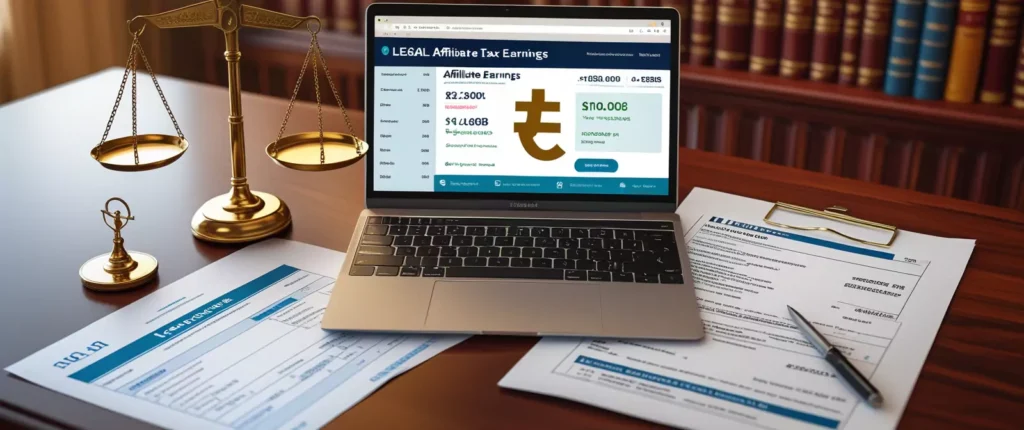Affiliate marketing is becoming one of the most popular ways to earn money online in India. With low investment and high potential returns, many people – especially students, freelancers, and bloggers – are exploring affiliate programs from platforms like Amazon, Flipkart, and even international networks like ClickBank. But a common question that arises is: “Is affiliate marketing legal in India?”
- What is Affiliate Marketing?
- Is Affiliate Marketing Legal in India?
- Laws & Regulations Related to Affiliate Marketing in India
- Do You Need to Register a Business or GST for Affiliate Marketing in India?
- Tax on Affiliate Marketing Income in India
- Common Legal Issues in Affiliate Marketing & How to Avoid Them
- Platform-Specific Legality: Amazon, Flipkart, ClickBank & More
- FAQs About Affiliate Marketing Legality in India
- Can I do affiliate marketing without a website?
- Is affiliate marketing legal for students in India?
- Is CPA marketing legal in India?
- Do I need to pay tax on affiliate marketing income in India?
- Can I do affiliate marketing on Instagram or YouTube?
- Is it safe to do affiliate marketing with foreign platforms?
- Can I get banned from affiliate programs?
- Do I need GST for affiliate marketing in India?
- Conclusion: Start Affiliate Marketing in India the Legal Way
The short and simple answer is yes – affiliate marketing is legal in India. There are no laws that ban or prohibit affiliate marketing if it’s done ethically and transparently. However, just like any other income-generating activity, there are certain legal guidelines to follow, such as paying taxes on earnings and complying with advertising standards.
As more Indians search for “how to start affiliate marketing legally in India” or “do I need GST for affiliate marketing in India”, it’s clear that legality and compliance are top concerns. It’s essential to understand the legal framework to avoid issues like non-compliance or tax penalties.
In this article, we’ll break down everything you need to know – from government rules to tax obligations -so you can start your affiliate journey confidently, knowing that you’re on the right side of Indian law.
What is Affiliate Marketing?
Affiliate marketing is a simple way to earn money online by promoting products or services. When someone buys a product using your special link (called an affiliate link), you earn a small commission. It’s like telling a friend about a good product, and the company thanks you with a reward.
Many people in India search online for questions like “How does affiliate marketing work?” or “Can I do affiliate marketing without investment?” The good news is – yes, you can! All you need is a smartphone or a laptop, internet connection, and basic knowledge of how to share links.
Here’s how affiliate marketing works in India:
- You join an affiliate program (like Amazon Associates, Flipkart Affiliate, etc.)
- You get a unique link for each product you promote.
- You share that link on your blog, YouTube channel, WhatsApp, or social media.
- If someone clicks and buys, you earn a commission.
It’s that easy!
People also ask, “Can I do affiliate marketing without a website in India?” Yes, you can share links on social media or YouTube. A website helps, but it’s not mandatory.
Affiliate marketing is legal and growing fast in India. With more users shopping online, the opportunity to earn through affiliate marketing is only getting bigger. Just remember to always be honest, avoid spam, and promote genuine products to build trust and income over time.
Is Affiliate Marketing Legal in India?
Yes, affiliate marketing is 100% legal in India. Many people search online asking, “Is affiliate marketing allowed in India?” or “Can I legally earn from affiliate marketing in India?” The answer is simple – as long as you follow basic rules, you are doing nothing wrong.
Affiliate marketing is like helping a company sell their product. You share a product link, and if someone buys using your link, you earn a commission. This is just like any other sales job – but done online. There is no Indian law that says affiliate marketing is illegal.
People also ask, “Do I need permission to start affiliate marketing in India?” No, you don’t need any special license. You can start from home with your phone or laptop. However, if your income grows, you may need to register your business and pay taxes.
Some beginners also ask, “Is Amazon affiliate program legal in India?” Yes, Amazon, Flipkart, and many other Indian and international brands run legal affiliate programs in India. Just make sure you read their terms and conditions and follow them.
So, if you’re worried about whether affiliate marketing is a scam or illegal in India – don’t be. It’s a safe and legal way to earn money online. Just be honest in your promotions, avoid fake links or spam, and follow the tax rules. That’s all you need to stay legal while earning online in India.
Laws & Regulations Related to Affiliate Marketing in India
Many people often search, “What are the legal rules for affiliate marketing in India?” or “Are there government guidelines for affiliate marketing?” The truth is – while affiliate marketing is legal, there are some important laws and rules you should know to stay safe and follow the right path.
First, the Consumer Protection Act 2019 in India says that you must not promote false or misleading products. So, always promote real and honest products to build trust and avoid legal trouble. If you say a product is good, make sure it really is.
Second, the Advertising Standards Council of India (ASCI) has guidelines. These rules say you must tell people that your link is an affiliate link. That means if you are earning money from the link, just add a simple line like: “This post contains affiliate links, and I may earn a small commission at no extra cost to you.”
Third, many people ask, “Do I need GST for affiliate marketing in India?” The answer is – if your earnings are more than ₹20 lakhs per year, you may need to register for GST. Also, you must file your income tax properly, as affiliate income is taxable in India.
There are no strict affiliate marketing laws written in one place, but you need to follow general rules related to online business, tax, and honest advertising. Follow these, and you can legally earn from affiliate marketing in India without any worries.
Do You Need to Register a Business or GST for Affiliate Marketing in India?
One of the most asked questions online is, “Do I need to register a company for affiliate marketing in India?” or “Is GST required for affiliate marketing income?” The answer depends on how much you earn.
If you’re just starting out and earning small commissions, there’s no need to register a company. You can work as an individual or a freelancer. Many beginners do affiliate marketing from home without any official business setup. You only need a PAN card and bank account to receive your payments.
But if your earnings grow – say more than ₹20 lakhs per year – then you may need to register for GST. This is because the Indian government wants you to pay Goods and Services Tax (GST) if your income crosses the threshold. You may also consider registering your business as a sole proprietorship, LLP, or private limited company if you want to look more professional and manage taxes better.
People also ask, “Can I do affiliate marketing without GST in India?” Yes, you can – until your income stays below the required limit. But you still need to pay income tax on your total earnings, no matter how small.
So, in simple words:
✅ No need to register a company to start
✅ GST is not needed for small earners
✅ Always file income tax if you earn money
Stay honest, and grow your affiliate business step by step!
Tax on Affiliate Marketing Income in India
A very common question people search for is, “Is affiliate marketing income taxable in India?” The answer is yes. Just like any other income, money earned from affiliate marketing is also taxed under Indian law.
When you earn from affiliate programs like Amazon, Flipkart, or international platforms like ClickBank or CJ Affiliate, it is treated as “income from business or profession.” So, whether you are doing affiliate marketing part-time or full-time, you need to report this income while filing your Income Tax Return (ITR).
Now, you might wonder, “Do I need to pay tax even if I earn a small amount?” Yes, if your total annual income (including affiliate earnings and any other income) is above the basic exemption limit (₹2.5 lakh for individuals under 60), then you must pay tax.
You can also deduct your business expenses like domain cost, hosting, software tools, or internet bills from your income before calculating tax. This helps in reducing the taxable amount.
People also ask, “How do I show affiliate income in ITR?” You can report it under the “Profits and Gains from Business or Profession” section while filing your return.
If you earn regularly, keeping your records clear and updated will help you avoid trouble in the future. Also, consult a tax expert once your income grows.
In short:
✅ Affiliate income is taxable
✅ File your ITR on time
✅ Keep track of earnings and expenses
This keeps your earnings legal and stress-free!
Common Legal Issues in Affiliate Marketing & How to Avoid Them
Many beginners search, “What are the legal problems in affiliate marketing?” or “How can I avoid getting banned from affiliate programs?” These are important questions because ignoring simple rules can lead to big problems.
One of the most common issues is not disclosing affiliate links. If you are promoting a product and earning from it, you must clearly tell your audience. People also ask, “Is it necessary to disclose affiliate links in India?” Yes! According to ASCI guidelines and global best practices, adding a simple line like “This post contains affiliate links” builds trust and keeps you safe legally.
Another issue is promoting fake or misleading products. Don’t promote products just for commission. If users buy something that doesn’t work or is fake, they may complain – and you could be in trouble legally or get banned from the affiliate program.
Spam is another big problem. People often ask, “Can I share affiliate links on WhatsApp or Facebook?” Yes, you can – but don’t spam. Sharing links again and again without adding value may get you blocked or reported.
Also, copying someone else’s content or using copyrighted images without permission is risky. Always use original or royalty-free content to stay safe.
So, to avoid legal issues in affiliate marketing in India:
✅ Be honest and transparent
✅ Don’t spam or mislead users
✅ Follow platform rules and local laws
Stay real, add value, and you’ll succeed legally and ethically!
Platform-Specific Legality: Amazon, Flipkart, ClickBank & More
Many beginners ask, “Is Amazon affiliate marketing legal in India?” or “Can I earn legally from ClickBank in India?” These are great questions because different affiliate platforms may have different rules.
Let’s start with Amazon Associates, one of the most popular affiliate programs in India. Yes, Amazon affiliate marketing is fully legal and safe. You can sign up for free, get your unique affiliate links, and start promoting products through your website, blog, YouTube, or social media. Just follow their program policies like not spamming, avoiding fake reviews, and disclosing that it’s an affiliate link.
Similarly, the Flipkart Affiliate Program is also legal and designed especially for Indian users. Many bloggers and influencers earn from it by sharing product links across channels. People also search, “Is Flipkart affiliate program legit?” – and the answer is yes.
Now, let’s talk about ClickBank, CJ Affiliate, and other international platforms. These programs are legal too, but they pay in foreign currency. Many people ask, “Is ClickBank legal in India?” Yes, you can join ClickBank from India. You just need to provide your bank details for international payments and follow RBI guidelines for receiving foreign income.
Just remember:
✅ Always read the rules of the affiliate program
✅ Avoid promoting banned or restricted products
✅ Don’t use paid ads unless the platform allows it
In short, affiliate marketing with platforms like Amazon, Flipkart, and ClickBank is legal in India – just follow the rules and stay transparent.
FAQs About Affiliate Marketing Legality in India
Can I do affiliate marketing without a website?
Yes, you can. While having a website helps in building trust and traffic, it’s not required. Many people earn through affiliate links shared on YouTube, Instagram, WhatsApp, Telegram, or Facebook. Just make sure not to spam and follow the platform’s rules.
Is affiliate marketing legal for students in India?
Absolutely! There is no age restriction on learning or doing affiliate marketing. Many students promote products and earn part-time income legally. You don’t need a company or GST if your income is low. Just focus on sharing genuine products and building honest content.
Is CPA marketing legal in India?
Yes, CPA (Cost Per Action) marketing is legal in India. It simply means you earn money when a user performs an action like signing up or filling a form. Just make sure the offers are from legal platforms and not promoting scams or fake content.
Do I need to pay tax on affiliate marketing income in India?
Yes, affiliate income is taxable in India. Even if you earn a small amount, it must be added to your total income when filing your Income Tax Return (ITR). If your income crosses ₹2.5 lakhs in a year, you may need to pay tax.
Can I do affiliate marketing on Instagram or YouTube?
Yes! Many affiliate marketers use Instagram Reels, YouTube Shorts, and even WhatsApp groups to promote products. You don’t need a website – just create honest content and share your affiliate links in bio, descriptions, or swipe-up links (if eligible).
Is it safe to do affiliate marketing with foreign platforms?
Yes, platforms like ClickBank, CJ Affiliate, ShareASale, and Impact are legal and safe to use from India. Make sure to provide your correct PAN and bank details, and follow RBI guidelines for receiving international payments.
Can I get banned from affiliate programs?
Yes. If you break the rules – like spamming links, giving fake reviews, or hiding affiliate disclosures – your account can be banned. Always follow the terms of each program carefully.
Do I need GST for affiliate marketing in India?
Not always. If your affiliate income is below ₹20 lakhs per year, you don’t need GST registration. But once you cross that limit, you should register under GST and charge it if required, especially when working with Indian companies.
Conclusion: Start Affiliate Marketing in India the Legal Way
Many people still wonder, “Is affiliate marketing safe and legal in India?” The simple answer is yes – it is completely legal as long as you follow the rules. Whether you’re a student, a housewife, a working professional, or someone looking to earn passive income online, affiliate marketing is a great option in India.
There are no specific laws that ban affiliate marketing, but you must follow general guidelines like paying taxes, disclosing affiliate links, and avoiding false promotions. Many beginners also ask, “How can I start affiliate marketing legally in India?” The process is simple: join a trusted affiliate program (like Amazon or Flipkart), share your links honestly, and make sure your content helps people.
You don’t need to open a company or get GST right away. But as your income grows, it’s smart to stay legally compliant. Search engines also show related queries like “Do I need to file ITR for affiliate earnings in India?” – and the answer is yes if your total income crosses the taxable limit.
In short, affiliate marketing is not a scam or illegal business. It’s a smart, legal, and proven way to earn money online in India. All you need is dedication, transparency, and some patience to grow.
Start small, learn as you go, and always stay on the right side of the law. That’s how you can build a long-term, legal affiliate marketing income in India without any worries.





